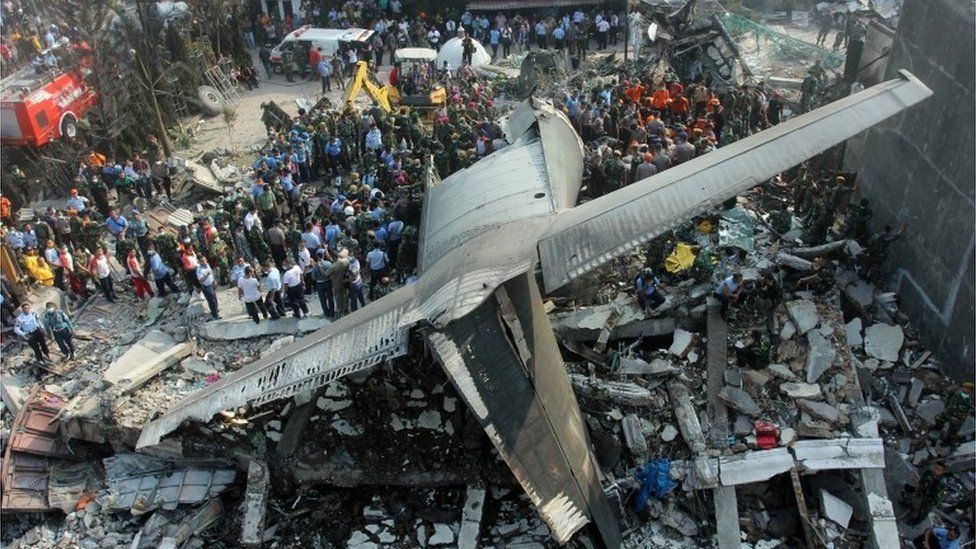Spotlight on Indonesia military's 'airline'
- Published

Janson Sinaga took his brother Sahat, Sahat's wife Rasia, their daughter and two other relatives to the military airport at 04:00 on that fateful Tuesday.
Sahat's family was visiting Medan, Indonesia's third largest city, from Ranai, a quiet town in the remote Natuna islands off Sumatra.
The family took a commercial flight to Medan, but to make their way home, Sahat decided to take a military transport plane because, he said, "it's more direct and it's cheaper", Janson remembers.
The C130 Hercules crashed shortly after takeoff, killing everybody on board. Janson lost five of his relatives.
Hitching a ride
While people around the world might have wondered how civilians could use a military aircraft for transport, Indonesians in places like Natuna islands see it as quite normal.
The islands are dots on the South China Sea, closer to the Malaysian part of Borneo than any large Indonesian cities. Only one commercial airline operates routine flights there and it does not take people very far.
Natuna native Mun said he had paid 500,000 rupiah ($37) when he took a Hercules a few years ago to get to another Indonesian island, Bintan.
"I stood on the plane as there were no seats available, but it was only a 45-minute ride," he said lightly. "Everybody knows we can hitch a ride with the military. It's not free, but we don't have many options."
Mun lost his cousin Rubianto in the doomed Hercules. Rubianto had just finished high school and gone to Sumatra to continue his studies.
'We will hunt them down'
The revelation that the military has been flying people to and from Indonesia's remote islands has been met with mixed response from government officials.
Military spokesman Fuad Basya strongly denies that the military was involved in the commercialisation of the flight. He says the armed forces only fly the relatives of service personnel. The definition of relatives, though, is quite loose. People who are not immediate family members are often allowed to get on board.
Air Chief Marshal Agus Supriatna, who leads the Indonesian Air Force, said it was possible that non-military-related civilians were listed as relatives by rogue elements within the ranks.
"That is a violation and if there is proof we will hunt them down," Mr Supriatna said.
But Vice President Jusuf Kalla told journalists on Wednesday that giving a ride to people in remote areas was part of the military's "civic mission."
"If there were empty seats, why not? Look at it as a service, as the military's assistance for people who need it," Mr Kalla said, but he refused to comment on the allegations that the passengers were charged for the ride.
Footage showed the burning wreckage in a residential street
Indonesians have also been voicing their mixed reactions on social media.
Nana Birings said on Facebook: "Maybe their destination is not reached by commercial flight. It's only appropriate that the passengers had to pay. Is the fuel free?"
But Facebook user Star Zul Sinar said: "This is the consequence of breaking the rules."
Time of sadness
The widespread allegation that elements within the military might have been profiting from its own aircraft is the last thing the armed forces needs in the midst of the tragedy.
The crash already drew attention to the sad state of the country's defence system.
Indonesian President Joko Widodo recently vowed to double the country's defence budget next year if the economy grew by 7%.
In reality, though, Indonesia is seeing its slowest growth in six years, so an immediate defence overhaul seems highly unlikely.
But while extending his condolences to the bereaved family of the victims, President Widodo also called on defence officials to use the tragedy to change the system.
"We need to modernise our weaponry," he said. "We need to decommission outdated military hardware, and our defence procurement system must move toward a self-sufficiency of the defence industry."
As the day turned into the evening, President Widodo broke his fast, then led a solemn military ceremony to honour the bodies of victims that were brought to an air base in Jakarta.
The end of the Muslim holy month of Ramadhan is approaching. It is supposed to be time for celebration, but for many families, it will be a time of great sadness.
- Published30 June 2015
- Published21 June 2012